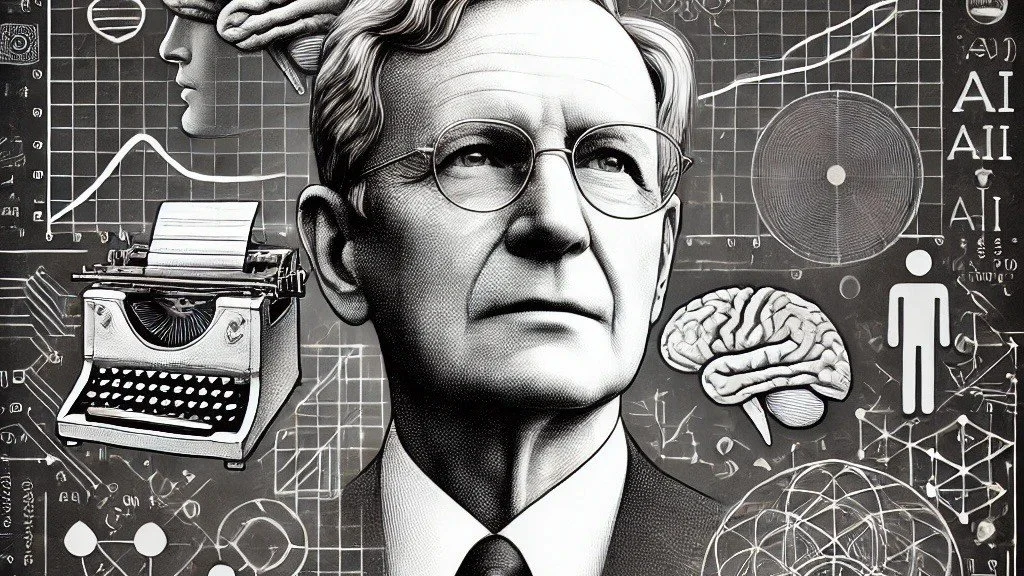Ode to a Great Operations Researcher and AI Pioneer: Celebrating Allen Newell
Few names stand as tall in the annals of operations research and artificial intelligence as Allen Newell. Born in 1927, Newell's career was one of innovation and interdisciplinary brilliance that continues to influence operations research, cognitive science, and AI today.
A Journey Begun at RAND Corporation
Post-World War II was a fertile ground for new ideas and methodologies. During this time, Newell began his illustrious career at the RAND Corporation, a think tank renowned for tackling complex logistical and strategic challenges. Newell collaborated with other thought leaders to develop innovative problem-solving techniques, laying the groundwork for modern operations research methodologies.
The Logic Theorist: A Leap into Artificial Intelligence
Newell's curiosity didn't stop at operations research. His profound interest in cognitive processes and human problem-solving led him to explore the nascent field of artificial intelligence. With his long-time collaborator, Herbert A. Simon, and programmer J.C. Shaw, Newell developed the Logic Theorist in 1956. Often regarded as the first AI program, the Logic Theorist was designed to prove theorems in symbolic logic. Remarkably, it not only proved 38 of the first 52 theorems in Principia Mathematica but also discovered more elegant proofs for some, showcasing the potential of computers to perform tasks requiring human-like reasoning.
The General Problem Solver: Mimicking Human Thought
Building on the success of the Logic Theorist, Newell and Simon introduced the General Problem Solver (GPS) in 1957. The GPS was an ambitious program designed to mimic human problem-solving strategies. By transforming complex problems into a series of subproblems using means-ends analysis, the GPS became a precursor to modern heuristic search algorithms. This innovation significantly influenced the development of algorithms capable of solving complex optimization problems in operations research and AI.
Bridging Human Cognition and Machine Intelligence
Newell's fascination with human cognition didn't just contribute to theoretical advancements; it had practical implications, too. He was instrumental in developing cognitive architectures and theoretical models that simulate human cognitive processes. One notable contribution was developing the GOMS model(Goals, Operators, Methods, and Selection rules), which analyzes user interface designs and predicts user performance. This model has been widely adopted to optimize human-computer interaction, enhancing the efficiency and effectiveness of various systems.
Advancing Decision-Making Models
Understanding that real-world decision-making is often constrained by limited information and cognitive resources; Newell explored the concept of bounded rationality based on Herbert Simond's work. This work was pivotal in developing decision-making models for human limitations, leading to more realistic and applicable solutions in operations research.
A Lasting Legacy in Cognitive Science and Beyond
Allen Newell's interdisciplinary approach bridged gaps between fields, fostering a deeper understanding of human cognition and its application in technology. His work influenced:
Educational Technology: By applying his cognitive architectures to learning, Newell impacted the development of intelligent tutoring systems that provide personalized instruction and feedback, enhancing educational outcomes.
Human-Computer Collaboration: Emphasizing systems that enhance rather than replace human capabilities, Newell's research laid the foundation for collaborative systems where humans and computers work together to solve complex problems.
Research Methodologies in AI: Advocating for empirical research and testable theories, Newell influenced the scientific rigor with which AI research is conducted today.
Expert Systems Development: His insights into human cognition and decision-making informed the design of expert systems replicating human expertise across various domains.
Conclusion: An Enduring Inspiration
Allen Newell was more than a pioneer; he was a visionary who saw the potential of computers to extend human capabilities and the importance of understanding human cognition to unlock that potential. His contributions have left a mark on operations research, artificial intelligence, cognitive science, and beyond.
As we navigate an era where AI and human-computer interaction are increasingly integral to our lives, Newell's work serves as both a foundation and an inspiration. His commitment to interdisciplinary research, ethical considerations, and practical applications continues to guide and challenge us to push the boundaries of what is possible.
Allen Newell's legacy is a testament to the profound impact one individual can have across multiple fields. His work will undoubtedly continue to influence and inspire future generations of researchers and practitioners.
Deming Updates
Joshua D. Haave reviews Bob Emiliani’s Kaizen Forever.
https://www.linkedin.com/feed/update/urn:li:activity:7252464373221236736/
Bob Emiliani shares an AI-generated podcast that explores Toyota's kaizen philosophy, contrasting it with traditional cost analysis methods.
https://www.linkedin.com/feed/update/urn:li:activity:7252263706883948544/
Angela Montgomery PhD celebrates Dr. W. Edwards Deming's birthday and highlights how his teachings on systems theory form the foundation for improving organizational outcomes.
https://www.linkedin.com/feed/update/urn:li:activity:7251969151131369473/
Dave Mangot connects Lean principles to software development, highlighting how Continuous Integration (CI) functions as an Andon cord.
https://www.linkedin.com/feed/update/urn:li:activity:7252003516326543360/
Nigel Thurlow explores global automotive statistics, highlighting Toyota as the top car manufacturer by volume while questioning the sustainability of Tesla's reliance on a single model.
https://www.linkedin.com/feed/update/urn:li:activity:7251216143644860416/
Daniel Prager explains how Test-Driven Development (TDD) mirrors Deming's PDSA cycle in software development.
https://www.linkedin.com/feed/update/urn:li:activity:7250979896062058496/
David Linthicum shares a picture of a Cray X-MP.
https://www.linkedin.com/feed/update/urn:li:activity:7250147658814619649/
